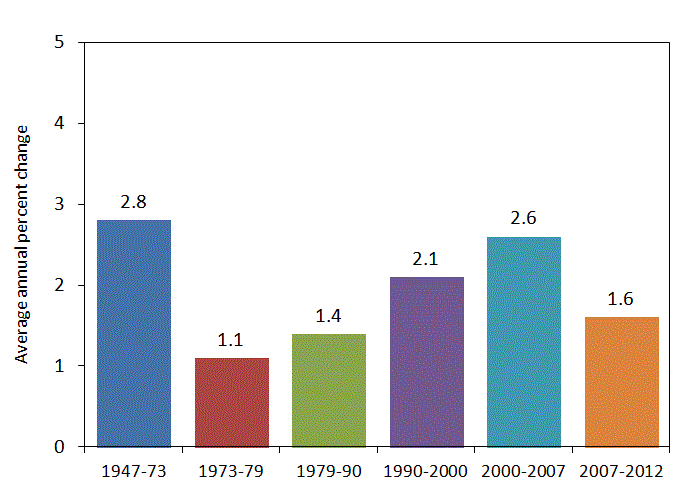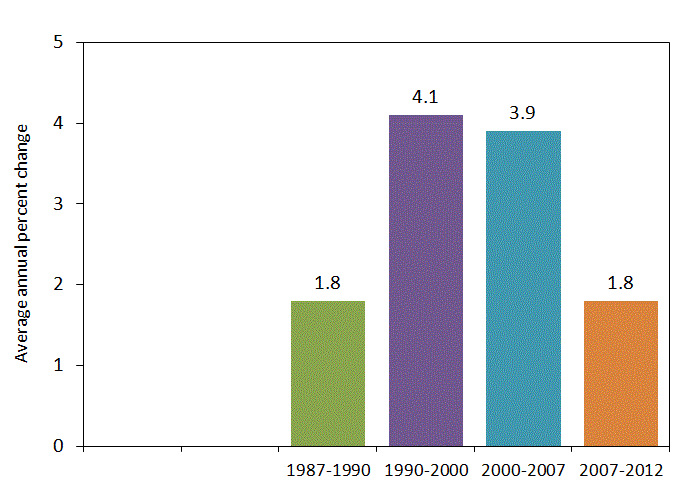This year marks the 100th anniversary of Kierkegaard’s birth. The father of existentialism had a clear target, to show that Hegel’s attempt to systematize all reality was an exercise in futility. According to Kierkegaard, Hegel left out the most important element of human experience: existence itself. Kierkegaard taught us that no philosophical system can explain human reality. In a similar manner, no matter how sophisticated our models and placebo treatments are, we cannot revive the economy unless productivity rises. The experience of reality (e.g. the excitement of seeing again an old dear friend, or the loss of a loved one) is what matters, not the “idea” of it. Similarly, it is the reality of jobs growth, real income increases, and most importantly productivity through higher production (and not via cost cutting which is limited) that matters, and not the warm feeling of the Fed’s QE activity.
Hegel emphasized universals and treated them using the Kantian platform of dialectics in the sense of thesis, antithesis, and synthesis. Kierkegaard argued for commitments and sacrifices. For Hegel it is the truth that matters. For Kierkegaard it is our relationship to the truth that matters the most. Similarly, the economic existence is actual, sometimes painful, but rests on some fundamental principles such as the rule of law, liberty, competition, anchoring policies and moves, and fairness.
A few days ago, we hosted Chairman Volcker’s speech at the Economic Club of New York (see current newsletter). In that speech Chairman Volcker clearly pointed out that when the Fed tried to do too much, distortions take place and thus risks rise. “The Federal Reserve – any central bank – should not be asked to do too much, to undertake responsibilities that it cannot reasonably meet with the appropriately limited powers provided.”
The reality of declining productivity, as shown below should serve as a wakeup call. (First graph shows the productivity change in the nonfarm business sector, while the second one in the manufacturing sector, all data from the Bureau of Labor Statistics).
Declining productivity growth in combination with an out-of-this-world monetary base (which may start leaking in the market i.e. becoming money supply), is a dangerous combination, especially when we take into account all the worthless paper “assets” flowing around in balance sheets.
Kierkegaard writings targeted the “system” – as he called it -of Hegel’s idealism that ignored human experience. The unintended consequence of Hegel’s dialectical method was the invention of dialectical materialism, a system that destroyed the lives of millions of people across many nations. My fear is that unless we start seeing again a converge between production and financial interests, the ephemeral effects of the placebo treatments will become a source of tremendous pain in a period that we can now estimate starting in about 24-30 months. The interest rate distortions that are in effect in the last few years will manifest themselves in the whole price structure of both goods, services, and assets, given that the change in the prices of liabilities – conceived as “assets” a.k.a. bonds – must pari passu bring about changes in the quantitative relationships of the whole economy.
The underlying uncertainty in the economy nowadays is partially due to the fact that the interest rate fixation cannot point to a predictable course of orderly unfolding. Hence demand and supply of savings cannot meet and therefore, businesses hesitate to invest and innovate given the imaginary and idealistic Hegelian scenarios of universal QEs that uplift us to economic heavens but have no understanding of the trade cycle and capital formation.
We may ride the ephemeral market trends – as we wrote in previous commentaries – but deep in our minds we need to hold Kierkegaard’s notion that the subjective nature of things will result in valuation distortions. It seems that after all, Orwell was wrong (this past week was the 64th anniversary of his 1984 book) and Huxley was right: there is no need to conceal the truth as long as you make it irrelevant and control the markets not by inflicting pain, but rather by inflicting pleasant placebo treatments of interest rate fixations. Maybe when the Day After arrives we can explore what is the essence of economic existentialism.


